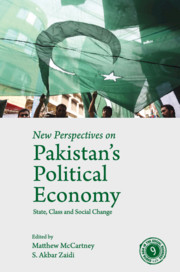Book contents
- Frontmatter
- Contents
- Preface
- Introduction
- 1 In a Desperate State: The Social Sciences and the Overdeveloped State in Pakistan, 1950 to 1983
- 2 The Overdeveloped Alavian Legacy
- 3 Institutions Matter: The State, the Military and Social Class
- 4 Class Is Dead but Faith Never Dies: Women, Islam and Pakistan
- 5 The Amnesia of Genesis
- 6 The Political Economy of Uneven State-Spatiality in Pakistan: The Interplay of Space, Class and Institutions
- 7 An Evolving Class Structure? Pakistan's Ruling Classes and the Implications for Pakistan's Political Economy
- 8 The Segmented ‘Rural Elite’: Agrarian Transformation and Rural Politics in Pakistani Punjab
- 9 Ascending the Power Structure: Bazaar Traders in Urban Punjab
- 10 Democracy and Patronage in Pakistan
- 11 From Overdeveloped State to Praetorian Pakistan: Tracing the Media's Transformations
- About the Contributors
- Index
2 - The Overdeveloped Alavian Legacy
Published online by Cambridge University Press: 26 April 2019
- Frontmatter
- Contents
- Preface
- Introduction
- 1 In a Desperate State: The Social Sciences and the Overdeveloped State in Pakistan, 1950 to 1983
- 2 The Overdeveloped Alavian Legacy
- 3 Institutions Matter: The State, the Military and Social Class
- 4 Class Is Dead but Faith Never Dies: Women, Islam and Pakistan
- 5 The Amnesia of Genesis
- 6 The Political Economy of Uneven State-Spatiality in Pakistan: The Interplay of Space, Class and Institutions
- 7 An Evolving Class Structure? Pakistan's Ruling Classes and the Implications for Pakistan's Political Economy
- 8 The Segmented ‘Rural Elite’: Agrarian Transformation and Rural Politics in Pakistani Punjab
- 9 Ascending the Power Structure: Bazaar Traders in Urban Punjab
- 10 Democracy and Patronage in Pakistan
- 11 From Overdeveloped State to Praetorian Pakistan: Tracing the Media's Transformations
- About the Contributors
- Index
Summary
Class, a neo-colonial state, ethnic–national oppression, patriarchy and imperialism continue to shape Pakistan's political economy as they have always done, albeit in ever-changing ways. Some notable efforts aside, attempts to understand how these various elements come together to produce a contradictory social totality are increasingly rare. In short, ‘grand’ theorising in the mould of Hamza Alavi's structural Marxism is no longer in vogue. Academic fashion now demands an emphasis on the everyday and discursive realms (Go 2016; Chibber 2014).
This chapter presents a somewhat traditional historical materialist analysis of the Pakistani state and its society, employing a Gramscian framework to elucidate my understanding of state and capitalism and the modes of politics that have become predominant since the 1980s. Gramsci is a traditionalist; it is another matter altogether that a particular reading of Gramsci has come to animate so many ‘post-Marxist’ theoretical formulations over the past couple of decades following from the seminal contribution of Laclau and Mouffe (1985). Subaltern Studies, of course, traced at least some of its genesis to Gramsci, but its focus shifted steadily away from the history of subaltern politics in colonial India towards more textual concerns (Sarkar 2002).
To a significant extent, this chapter shares with the Subaltern Studies project a suspicion of mainstream scholarship in which actors, events and processes ‘from below’ are conspicuous by their absence. Indeed, the need to move beyond the bird's-eye formulations that have long dominated radical discussions is even more urgent in Pakistan than in postcolonial contexts such as India where scholarship in the social sciences and humanities has been much more dynamic. In this spirit, this chapter presents a critical engagement with Alavi and his seminal theory of the overdeveloped postcolonial state (Alavi 1972), following Zaidi (2014). While recognising the substantial contributions that Alavi made to our understanding of Pakistan, and the post-colony at large, it is high time that we look beyond such icons, because critical scholarship cannot remain beholden to even seminal formulations indefinitely. It is an indication of how barren the Pakistani intellectual landscape has been since the 1980s that many scholars still automatically defer to Alavi's work, a point emphasised by McCartney and Zaidi in the Introduction to this volume.
- Type
- Chapter
- Information
- New Perspectives on Pakistan's Political EconomyState, Class and Social Change, pp. 56 - 74Publisher: Cambridge University PressPrint publication year: 2019



